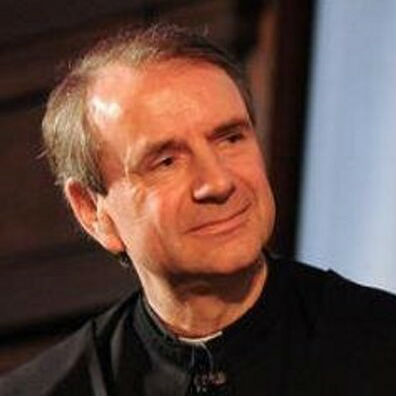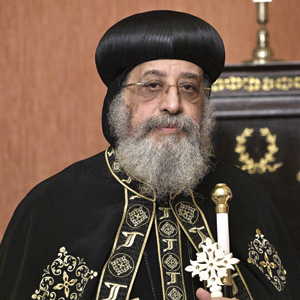FGM campaign
The Orthodox Coptic Church is to launch an awareness-raising campaign against the practice of female genital mutilation, which is widespread among Christian communities in Upper Egypt.
The campaign, authorised by Patriarch Tawadros II (pictured), will focus on the serious physical and psychological consequences of this practice. Awareness-raising work will target young couples in such contexts as courses for marriage preparation. Warning notices will be put up near church premises in which baptisms take place. According to a Unicef report in 2013, covering 29 countries, Egypt has the highest total number of women who have undergone female genital mutilation in Africa – 27.2 million out of a population of 95 million. The practice is common among Muslims and Coptic Christians.
Iraq’s Chaldean Catholic Church held a Youth Festival in the Christian town of Alqosh that attracted more than 550 young people from around Iraq, hoping to revive Christian life in the Nineveh plains. Several days of prayer, reflection, music and dancing started on 27 July. The young visitors met Chaldean Catholic Patriarch Louis Raphael Sako. Fr Samir Youssef, a local Chaldean priest, and one of those behind the drive to encourage young people to breathe new life into Mosul, the Nineveh plains, and Iraq generally, said that after years of violence and war, the younger generation faced the task of “building life together”.
Somaliland’s Religious Affairs Minister, Sheikh Khahlil Abdullahi Ahmed, told a press conference last Sunday that the authorities would permit a Catholic Church in Hargeisa, capital of the self-declared state, to reopen because a church had existed there before. It has been closed for three decades. The minister said that while the Somaliland constitution “does not allow any religion other than Islam to be promoted”, the constitution and sharia law “allow foreigners to work in Somaliland and to practise their religion privately”. Therefore, foreign Christians could worship in the pre-existing Catholic Church of St Anthony of Padua, he said.
Prayers for heroes
Christian, Muslim, Hindu, Baha’i and Jewish religious leaders joined Aung San Suu Kyi, in her home in Yangon, Myanmar, on 19 July to pray for heroes including her father, General Aung San. The interfaith prayer meeting marked the 70th anniversary of the death of nine patriots assassinated in 1947 – five Buddhists, two Muslims, one Christian and one Hindu.
Ms Suu Kyi, head of the ruling National League for Democracy party, urged the 30 people attending to construct a nation built on love. Auxiliary Bishop John Saw Yaw Han of Yangon, who also attended, said: “Suu Kyi realises the role of religious leaders is very important for nation-building and peace”. A statement from the ruling party said the country, which has been accused of not protecting its Rohingya Muslim community, needs to learn lessons from Martyrs’ Day and to aim towards democratic values, based on equal rights and peaceful coexistence.
The secretary-general of the Congolese Bishops’ Conference has said that “without a popular uprising, there will be no change in the Democratic Republic of Congo, unfortunately”. While stopping short of calling for an uprising, Fr Donatien Nshole was expressing the exasperation felt by the bishops over the failure of attempts to hold a dialogue with President Joseph Kabila. “We made a mistake last year, thinking we could reach elections through negotiations, and therefore avoid a possible massacre,” Fr Nshole said last week. A two-day national strike has been called for 8 and 9 August to protest against Kabila clinging to power. His mandate expired on 20 December 2016.
Romania’s Orthodox Patriarch has apologised to Christians for his Church’s involvement in sexual abuse. He spoke after several priests were suspended in a spate of cases. “With pain in my soul, I ask forgiveness for the convulsion caused by public accusations against certain prominent clergy, of deviating from Christian morality,” said Patriarch Daniel, 66. His statement was the first public acknowledgment of abuse in the Romanian Orthodox Church.
Civil war warning
A Polish archbishop has warned of civil war unless tensions between the Government and opposition supporters can be calmed. “I’m very concerned by calls to whip up emotions, since emotions can lead to irrational and brutal acts”, Archbishop Henryk Hoser of Warsaw-Praga said. “This is how civil wars have started in many countries.” In a Vatican Radio interview, the archbishop said that President Andrzej Duda had “acted like a statesman” last week when he vetoed two controversial bills. These would have given the Government the right to fill the Supreme Court with its own nominees.
New cathedral seats 2,000
The Diocese of Raleigh, North Carolina, consecrated its new Cathedral of the Holy Name of Jesus. The structure, which seats 2,000 people and sits on a hill overlooking the city, replaces the 250-seat Cathedral of the Sacred Heart, located in the city centre. The population of the diocese, which covers the eastern half of the state, has doubled in the past 10 years due to an influx of immigrants. It now has 500,000 Catholics.
In the heated debate on same-sex marriage triggered by the German Bundestag vote in favour of it on 30 June, it was imperative to “get back to calling a spade a spade”, Cardinal Christoph Schönborn observed in an article in the Vienna archdiocesan church paper Der Sonntag of 30 July.
He liked to quote the Chinese proverb: “Call a circle a circle and a square a square and political order will be restored,” Schönborn declared. “It is natural for children to want their mother and father to share the responsibility for them,” he wrote, while insisting that civil unions between gay partners had his “full respect”.
Adelaide’s Archbishop, Philip Wilson, told a 24 July Mass to commemorate the 50th anniversary of the death of Cardinal Joseph Cardijn that the impetus of the Young Christian Workers and Young Christian Students movements he founded had suffered as a result of the Second Vatican Council. He said its focus was on the renewal of the life of the Church, “rather than giving witness to the Lord in our lives”.



 Loading ...
Loading ...